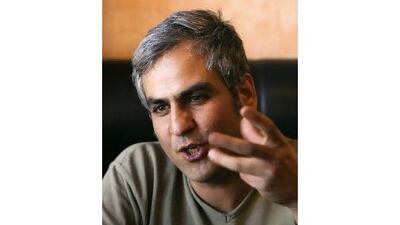TEHRAN // A movie that depicts a nervous US soldier accidentally shooting a little girl during a night raid on her home in Iraq might not be every American's idea of a possible Oscar winner.
The fact that it was written and directed by an Iranian makes Farewell Baghdad, the gritty story of Americans in Iraq, even more controversial.
Despite, or perhaps because of that, it is Iran's official entry for the 2011 Academy Awards, something its 37-year-old director said was the subject of a "misunderstanding".
"There are people who think I have been paid a lot of money to make this movie for the Iranian government. It's clear to me that those people have not watched the film," Mehdi Naderi said.
Far from being state propaganda, Naderi said his film, which explores the motivation and doubts of both US soldiers and Iraqi insurgents, was made in the face of unhelpful pressure from the authorities and on a shoestring budget.
"The budget for Farewell Baghdad can be compared to what Sean Penn spends on his cigarettes or what Nicole Kidman spends for a small part of her make-up," he said in an interview in a Tehran coffee shop.
The movie follows the Polish-American Daniel, a failed boxer who signs up to the army and finds himself on tense foot patrols in Iraq. After a comrade accidentally shoots a little girl in her home, both men leave their base and take off into the desert.
Daniel's life is eventually saved by Saleh, a would-be suicide bomber who hates Americans but reluctantly feels compelled to help another lost soul.
Given Iran's 30-year enmity with the United States, which is often referred to as the "Great Satan", a movie from here about Washington's long and painful engagement in neighbouring Iraq might be assumed to portray Americans as the villains, oppressing a fellow Muslim nation.
But Farewell Baghdad does not paint a simplistic picture of Americans as the bad guys. Daniel is shown as a regular guy struggling to come to terms with the violent, alien environment in which he finds himself.
"I don't want my film to be seen as a tool of soft war against the West," Naderi said, urging viewers to look beyond the politics and see the human story where both sides, Iraqis and Americans, can learn to be friends, even in extreme circumstances.
Filmmaking is a tricky business in Iran, where the government keeps a close eye on political content and checks to ensure Islamic norms, such as women's dress codes, are respected.
The state has increased its pressure on filmmakers since last year's disputed presidential election, which was followed by the biggest street protests since the 1979 revolution that ushered in the world's first Islamic republic.
"It took six years to get the permission to make this film and we changed the script about 18 times to satisfy officials," Naderi said. "I want to show how an Iranian filmmaker can make a movie without any financial support in less than two months from a country with lots of rules and censorship."
One Iranian movie industry official said Farewell Baghdad's "anti-American content" might help its chances of winning an Oscar.
"The Oscars set a new policy every year and usually other countries are not aware of these policies," Shafi Agha Mohammadian, the head of a state body that promotes documentaries, said in an interview with Mardomsalari newspaper.
"We believe there is currently a policy of opposing the deployment of US military forces around the world - a sentiment also shared by Hollywood."
Jafar Panahi, one of Iran's best-known directors and winner of several international awards, is standing trial for making a film without government permission.
"My case is a perfect example of being punished before committing a crime. You are putting me on trial for making a film that, at the time of our arrest, was only 30 per cent shot," he said in a statement to the court, which he released publicly.
Panahi's supporters believe his sympathies for President Mahmoud Ahmadinejad's election rival, the opposition leader Mirhossein Mousavi, drew the ire of the hardline authorities. He was arrested in March and spent 88 days in jail, during which he went on hunger strike.
Panahi's case received wide international coverage after he was blocked from leaving Iran to attend the Venice Film Festival in September. The US director Steven Spielberg and the French actress Juliette Binoche were among the movie luminaries who spoke up for him.
Naderi's film is unlikely to garner as much attention in Hollywood.
Before Farewell Baghdad, another Iranian movie about Iraq, Turtles can Fly, was entered as Iran's candidate for the 2004 Foreign Language Oscar. It focused on Kurdish victims of Saddam Hussein's regime and the US-led invasion of Iraq. It was not shortlisted.
The Islamic republic has entered more than a dozen films for the Oscars since 1994, when it first started participating, including Panahi's acclaimed The White Balloon.
But among all the entries, only Children of Heaven by Majid Majidi was nominated, in 1998.
Farewell Baghdad is one of 65 films entered for the award this year. Only five of them will receive an official nomination for the golden statuette.
But, with or without a prize, Naderi was proud to have completed his film, which he said was a plea for peace, something sorely lacking in the Middle East.
"If Marco Polo were to begin his world tour in the present epoch, he would not have succeeded as he would probably be killed before arriving in Bagdad."
* Reuters

